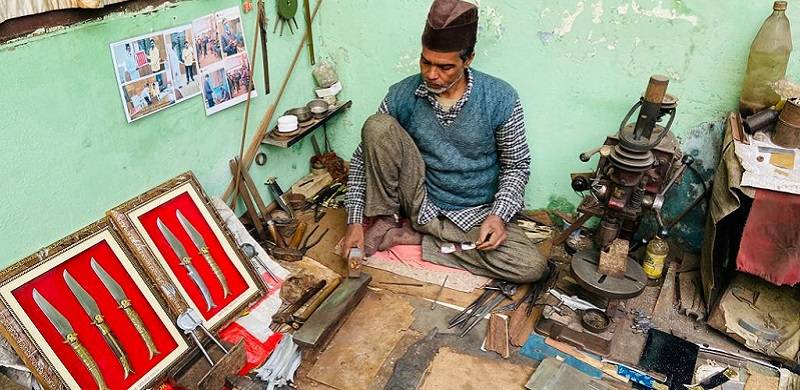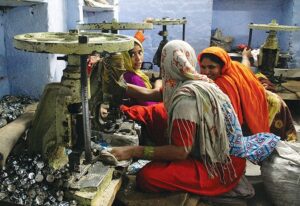
India’s most populated and politically significant state of Uttar Pradesh (UP) was once a skills capital and the industrial base of South Asia for many centuries, as Mughal rulers had assigned particular skills to each district. For example, Aligarh was recognised for manufacturing locks, Rampur for knives, Sambal for decorative items from animal horns, Moradabad for brassware, and Mirzapur-Bhadohi for carpet weaving, silk weaving in Varanasi or Banaras, chikckenkari in Lucknow, etc.
Till the advent of the British, UP was a major contributor to India’s exports. But as the state begins its elections in seven phases starting from Feb 10 to March 7, no political party is interested in the welfare of artisans there or improving their conditions.
Just about 200 kilometres from New Delhi, the small town of Rampur was once the manufacturing hub for folding knives, famously known as Rampuri Chaku, giving fierce competition to Swiss knives in the international markets. There is a widely held belief that since most of the artisans are Muslims, there is no stamina left in any political party to help the small scale or cottage industrial units.
folding knives, famously known as Rampuri Chaku, giving fierce competition to Swiss knives in the international markets. There is a widely held belief that since most of the artisans are Muslims, there is no stamina left in any political party to help the small scale or cottage industrial units.
In the 1970s and 1980s, Rampuri knives were the most sought-after prop for villains in Bollywood. Every goon in town carried these knives in their pocket. A famous sequence in a Bollywood film would be: the villain carrying a Rampuri knife in his pocket, taking it out, pressing the button to open the knife and hitting his opponent. This would be a part of several action sequences.
But three decades later, these knives are no longer a trend in the film industry and the artisans who used to make these knives have moved out of Rampur to the suburbs of Delhi. They either work as rickshaw pullers or land up in some odd jobs to make ends meet. Unlike Swiss knives, there was no further innovation or state support to help the industry continue to grow.
Rampuri vs. Swiss knives
Today in Rampur it is hard to find shops selling these renowned knives. The manufacturers who would have previously stocked these knives have now started selling Chinese knives. From a time when thousands would line up outside government offices seeking a license to manufacture Rampuri knives, today there are just two shops in the city that continue to run a small manufacturing unit and sell the knives.
“We are just struggling to keep the tradition alive,” said Shenzad Ansari who helps his father in the trade. Three of his brothers have moved to Delhi and work in the construction industry and the fourth is a fruit seller.
 The carpets of Hardoi and the glass industry of Firozabad also face the same fate as the silk weavers of Banaras and the lock makers of Aligarh. On a visit to Banaras about two years ago, while interacting with the silk weavers this reporter had learnt that because of the lack of any government support, new taxation rules, and non-availability of loans, the weavers were struggling to even get raw material.
The carpets of Hardoi and the glass industry of Firozabad also face the same fate as the silk weavers of Banaras and the lock makers of Aligarh. On a visit to Banaras about two years ago, while interacting with the silk weavers this reporter had learnt that because of the lack of any government support, new taxation rules, and non-availability of loans, the weavers were struggling to even get raw material.
“When Narender Modi contested and won the Lok Sabha election from here, we thought that the fate of Banaras and its craft will receive a government’s patronage. But no such help came. While the big manufacturers have managed to survive, the small craftsmen are dependent on middlemen and barely manage to cover their expenses,” a weaver had said.
As these trades have come on the verge of extinction, it is the skilled workforce comprising mostly of Muslims who have become the worst victims of government apathy. Small scale industries are suffocating under the new tax regime of the Bharatiya Janata Party (BJP) and industries of UP seems to be a major victim of these policies. The demonetisation announced by Modi’s government in November of 2016 sucked the blood out of small and medium scale industries, followed by the new Goods and Service Tax regime, and the pandemic lockdowns, which have made the industry suffer even further.
Electorally the most significant state, from where both Narender Modi and Congress leader Sonia Gandhi contest elections and which has given the country nine out of 14 Prime Ministers, UP still struggles with issues like poverty, unemployment and lawlessness.
No mention of economic issues
While issues of development, unemployment, inflation and Covid-19 mismanagement find no mention in any political campaigns, what is left in UP is communal politics, where the ruling BJP and 80 per cent majority Hindu population are contesting against the population's 20 per cent Muslims. BJP’s election campaign is based on building temples, poll sops and stringent punishment for 'Love Jihad' or inter-religion marriages between Hindus and Muslims.
In the poll season, Lucknow, the capital of UP with a long history of Shia-Sunni riots but never any Hindu-Muslim riots, is now witnessing the growing fault line between the two communities. The city that was known for its well-blended Hindu and Muslim culture is now experiencing growing communal ghettos. Even when there were incidences of police opening fire at civilians at Ayodhya in 1990, while a curfew was imposed in the state and there were reports of Hindu Muslim clash all over, Lucknow did not witness any untoward incident.
Hindus who have lived in the Muslim dominated areas for generations are now selling their premises and shifting to the Hindu belt and vice versa. “This two-way phenomenon has gained momentum since the past few years. While there is no friction on the ground, but a sense of mistrust is being created and there is a growing discomfort between the communities,” explained journalist Hissam Siddiqui who is a member of Lucknow civic society.
Till the advent of the British, UP was a major contributor to India’s exports. But as the state begins its elections in seven phases starting from Feb 10 to March 7, no political party is interested in the welfare of artisans there or improving their conditions.
Just about 200 kilometres from New Delhi, the small town of Rampur was once the manufacturing hub for
 folding knives, famously known as Rampuri Chaku, giving fierce competition to Swiss knives in the international markets. There is a widely held belief that since most of the artisans are Muslims, there is no stamina left in any political party to help the small scale or cottage industrial units.
folding knives, famously known as Rampuri Chaku, giving fierce competition to Swiss knives in the international markets. There is a widely held belief that since most of the artisans are Muslims, there is no stamina left in any political party to help the small scale or cottage industrial units.In the 1970s and 1980s, Rampuri knives were the most sought-after prop for villains in Bollywood. Every goon in town carried these knives in their pocket. A famous sequence in a Bollywood film would be: the villain carrying a Rampuri knife in his pocket, taking it out, pressing the button to open the knife and hitting his opponent. This would be a part of several action sequences.
As these trades have come on the verge of extinction, it is the skilled workforce comprising mostly of Muslims who have become the worst victims of government apathy.
But three decades later, these knives are no longer a trend in the film industry and the artisans who used to make these knives have moved out of Rampur to the suburbs of Delhi. They either work as rickshaw pullers or land up in some odd jobs to make ends meet. Unlike Swiss knives, there was no further innovation or state support to help the industry continue to grow.
Rampuri vs. Swiss knives
Today in Rampur it is hard to find shops selling these renowned knives. The manufacturers who would have previously stocked these knives have now started selling Chinese knives. From a time when thousands would line up outside government offices seeking a license to manufacture Rampuri knives, today there are just two shops in the city that continue to run a small manufacturing unit and sell the knives.
“We are just struggling to keep the tradition alive,” said Shenzad Ansari who helps his father in the trade. Three of his brothers have moved to Delhi and work in the construction industry and the fourth is a fruit seller.
 The carpets of Hardoi and the glass industry of Firozabad also face the same fate as the silk weavers of Banaras and the lock makers of Aligarh. On a visit to Banaras about two years ago, while interacting with the silk weavers this reporter had learnt that because of the lack of any government support, new taxation rules, and non-availability of loans, the weavers were struggling to even get raw material.
The carpets of Hardoi and the glass industry of Firozabad also face the same fate as the silk weavers of Banaras and the lock makers of Aligarh. On a visit to Banaras about two years ago, while interacting with the silk weavers this reporter had learnt that because of the lack of any government support, new taxation rules, and non-availability of loans, the weavers were struggling to even get raw material.“When Narender Modi contested and won the Lok Sabha election from here, we thought that the fate of Banaras and its craft will receive a government’s patronage. But no such help came. While the big manufacturers have managed to survive, the small craftsmen are dependent on middlemen and barely manage to cover their expenses,” a weaver had said.
As these trades have come on the verge of extinction, it is the skilled workforce comprising mostly of Muslims who have become the worst victims of government apathy. Small scale industries are suffocating under the new tax regime of the Bharatiya Janata Party (BJP) and industries of UP seems to be a major victim of these policies. The demonetisation announced by Modi’s government in November of 2016 sucked the blood out of small and medium scale industries, followed by the new Goods and Service Tax regime, and the pandemic lockdowns, which have made the industry suffer even further.
Electorally the most significant state, from where both Narender Modi and Congress leader Sonia Gandhi contest elections and which has given the country nine out of 14 Prime Ministers, UP still struggles with issues like poverty, unemployment and lawlessness.
No mention of economic issues
While issues of development, unemployment, inflation and Covid-19 mismanagement find no mention in any political campaigns, what is left in UP is communal politics, where the ruling BJP and 80 per cent majority Hindu population are contesting against the population's 20 per cent Muslims. BJP’s election campaign is based on building temples, poll sops and stringent punishment for 'Love Jihad' or inter-religion marriages between Hindus and Muslims.
In the poll season, Lucknow, the capital of UP with a long history of Shia-Sunni riots but never any Hindu-Muslim riots, is now witnessing the growing fault line between the two communities. The city that was known for its well-blended Hindu and Muslim culture is now experiencing growing communal ghettos. Even when there were incidences of police opening fire at civilians at Ayodhya in 1990, while a curfew was imposed in the state and there were reports of Hindu Muslim clash all over, Lucknow did not witness any untoward incident.
Hindus who have lived in the Muslim dominated areas for generations are now selling their premises and shifting to the Hindu belt and vice versa. “This two-way phenomenon has gained momentum since the past few years. While there is no friction on the ground, but a sense of mistrust is being created and there is a growing discomfort between the communities,” explained journalist Hissam Siddiqui who is a member of Lucknow civic society.

